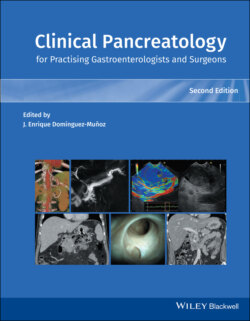Читать книгу Clinical Pancreatology for Practising Gastroenterologists and Surgeons - Группа авторов - Страница 118
Acute Pancreatitis and Systemic Complications: Definitions, Importance, and Incidence
ОглавлениеThe revision of the Atlanta classification [4] provides definitions for systemic complications and organ failure (see Chapter 3). Organ failure is defined as a score of 2 or more on the modified Marshall score, in at least one of three organ systems (respiratory, renal, and cardiovascular) (Table 8.1) [4]. Organ failure lasting for 48 hours or less is called transient organ failure. Persistent organ failure is defined as organ failure lasting for more than 48 hours. While transient organ failure is associated with increased morbidity, persistent organ failure is characterized by maximum morbidity and a very high risk of death, 50% according to a nationwide prospective study [5]. For this reason, persistent organ failure is a marker for severe disease (the core of its definition in the revision of the Atlanta classification). “Systemic complications” refers to exacerbation of preexisting comorbidity precipitated by the episode of AP, for example coronary artery disease or chronic lung disease. Systemic complications following this definition are associated with worse outcomes [5]. When exacerbation of preexisting comorbidity leads to persistent organ failure, it is considered as persistent organ failure [4].
The overall incidence of organ failure depends on the type of hospital. Tertiary care hospitals receiving transferrals from other centers will have a falsely high proportion of patients with organ failure (up to 40%) [1]. In contrast, according to population‐based studies, between 8 and 20% of patients develop organ failure [1]. In the previously mentioned nationwide prospective study, 14% of the patients had organ failure, comprising 7% transient and 7% persistent organ failure, and 8.5% single and 5.6% multiple organ involvement [5]; mortality was 7% for patients with transient and 52% for patients with persistent organ failure. Multiple organ failure was also associated with a 54% risk of death, higher than with single organ failure (13%). According to a post‐hoc analysis of a prospective database, 38% of patients with necrotising AP develop organ failure; 92% of them had respiratory failure with 37% mortality, 82% cardiovascular failure with 40% mortality, and 44% renal failure with 47% mortality [6].
Table 8.1 Modified Marshall scoring system for organ dysfunction.
Source: Banks et al. [4]. © 2013 BMJ. Reproduced with permission of BMJ Publishing Group.
| Organ system | Score | ||||
|---|---|---|---|---|---|
| 0 | 1 | 2 | 3 | 4 | |
| Respiratory (PaO 2/FiO 2) | >400 | 301–400 | 201–300 | 101–200 | ≤101 |
| Renal (serum creatinine, μmol/l) | ≤134 | 134–169 | 170–310 | 311–439 | >439 |
| Renal (serum creatinine, mg/dl) | <1.4 | 1.4–1.8 | 1.9–3.6 | 3.6–4.9 | >4.9 |
| Cardiovascular (systolic blood pressure, mmHg) | >90 | <90, fluid responsive | <90, not fluid responsive | <90, pH <7.3 | <90, pH <7.2 |
